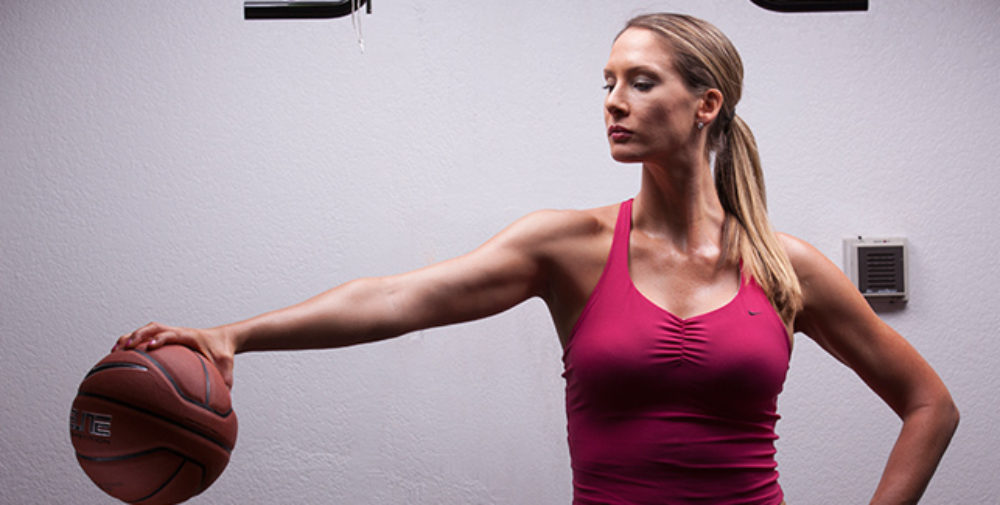Carolyn Moos USA BB, B.A.
Stanford, FIBA/WNBA, M.A. USC, ACE
Personal trainer, yoga instructor, nutrition consultant.
Student-athletes and parents, I would like to take the opportunity to introduce myself prior to writing about the important of Sports nutrition for you and your athletic family! My name is Carolyn Moos, I played for USA Basketball (6’5” F/C) winning a gold medal in the Jr. Olympics, I have a B.A. from Stanford, played for FIBA/WNBA, have a M.A. from USC and currently practice as an ACE Certified Personal trainer, yoga instructor and nutrition consultant in Los Angeles as well as provide virtual training (Skype, Flip) online with nutrition log analysis.
Sports nutrition directly affects the ratio of muscle versus body fat that an athlete builds as they train hard (and smart) for their sport. It is not just about what amount of calories your body needs, but it is integral to get the right macronutrient profiled ratios of proteins, carbohydrates and fats in consistently planned meals throughout the day. Eating the right types of foods in each given category at the right times also affects the absorption rates of glucose, amino acids and other key nutrients. I specialize in meal timing, glycemic index (rate at which glucose is broken down in your blood stream which is the primary source of mental and physical energy), macronutrient profiling and menu planning relative to training schedules. Different sports and activities utilize slightly different ratios of macronutrients and most importantly you need to fuel for the intensity, duration and mode for your sport.
I would like to list some of the mistakes I see most often with athlete clients I work with relative to their sports nutrition. (1) Skipping breakfast: this is like putting logs on a fire, your fire being your basal metabolic rate- not to mention you are glucose deprived in the morning as your body repairs itself during sleep- YOU NEED A WELL BALANCED breakfast to jump start your metabolism and to give you energy you need for your morning workouts and high demand academics-
YES nutrition directly affects your mental concentration, too! (2) Not eating every 3 hours- YOU need to consume food every 3 hours to keep your glucose levels steady- ideally 6 mini meals all planned with balanced macronutrients is key (this along with sleep deprivation directly affects your cortisol to endorphin ratios!- Cortisol can inhibit muscle repair- you can email me for more information.
Example of meal timing would include: 7AM breakfast, workout or school, 10:30 mid morning mini meal or post workout meal, 1:00PM Lunch, 4:00PM mini meal or pre practice snack for student-athletes- portable non-perishable options can be discussed! 7PM post workout (student-athletes) or evening meal- ideal ratio of macronutrients and 9:30PM pre bed mini snack Exact menu planning can be discussed with me directly via [email protected] . Another mistake athletes make with their nutrition (3) too little variety of fruits, vegetables, proteins, complex carbs- variety in general! for fruits and vegetables I keep it simple and I say “Eat a rainbow”- varied colors- the richer the colors the better ex: spinach or collard greens much better than romaine lettuce and broccoli much better than cauliflower (as vegetables), variety of grains, and variety of amino acids through all proteins.
(4) Lack of understanding of goals relative to nutrition. For example: do you want to bulk up and get more muscle- ex: defensive lineman in football or a center who just needs a little more explosiveness. TOO often athletes try to bulk up by just adding more of ANY type of calories- WRONG way to do it. You will build based upon WHAT you eat too- ex: muscle vs. fat with the baseline assumption your workouts are intense enough to build muscle. I also specialize in sport specific training relative to specific goals (bulking up vs. leaning out- increased coordination etc.). You also have to carefully track your nutrition logs if your goal is to lean out (keep hard earned lean muscle tissue on you, while getting a bit more fit so you increase your speed and endurance). Once you clearly understand your goals, nutrition and training can be shaped to fit your personal interests. I also work with clinical patients such as type II diabetics and there exists synergy between meal timing and understanding the glycemic index for mass public, type II diabetics as well as elite athletes!
Everything you put in your body and your overall lifestyle is just as important. As an elite athlete you need to make mature decisions that help you function better-(no alchohol), drink plenty of water, eat at consistent times and rest at consistent times relative to goal of muscle repair. How macronutrients affects your blood glucose directly affects your performance and what type of a body you build short and long term. Sports nutrition created the foundation for ideal body composition, while lowering risk of injury, improving performance and prolonging your career. If you have inquiries about how nutrition log analysis can help you- you can e-mail me at [email protected] with the e-mail title-head “FITT4Life-Nutrition.” I do work with athletes from all around the world via e-mail, phone and Skype. I also provide virtual grocery store tours (Flip emailed videos) to teach student-athletes and parents how to shop and stock up on healthy foods and provide Sports camps and large groups Skype nutrition presentations. I can work with you anytime, from anywhere to help you be your best. -Carolyn Moos USA BB, B.A. Stanford, FIBA/WNBA, M.A. USC, ACE Personal trainer, yoga instructor, nutrition consultant. [email protected]
